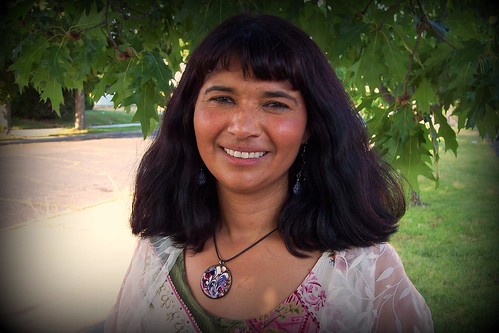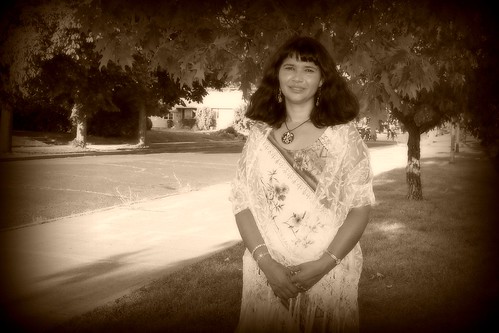Luisa Orellana teaches English as a Second Language at the Institute for Extended Learning in Spokane. As a former refugee from the civil war of El Salvador, she holds a special understanding and compassion for her students, many of whom lived through similar experiences in countries around the world. As a person, I admire her passion for human dignity. As my co-worker, I'm honored to share her story in some small way.
On March 17, 1983, Luisa’s father Tanis Orellana disappeared during El Salvador’s civil war. The family believes he was killed soon after his disappearance, but they have never been able to locate the body. For 25 years, they pondered his ultimate fate without resolution, but recently they received a tip from a woman in El Salvador who claims to have personal papers that were in his possession at the time of his disappearance.
Luisa is returning to El Salvador this week to see if she can finally locate her father’s remains.
Tanis Orellana was a Catholic deacon working under the martyred Archbishop Oscar Romero. During that time, the government accused many people of being communists, including teachers, ministers, and students. Tanis worked in the ministry, serving the poor in over 28 villages, so he came under suspicion of the government.
Luisa remembers when Archbishop Romero used to visit their home and play with the children.
"Romero was killed by a shot to the heart on March 24, 1980, while celebrating Mass at a small chapel located in a hospital called 'La Divina Providencia' one day after a sermon where he had called on Salvadoran soldiers, as Christians, to obey God's higher order and to stop carrying out the government's repression and violations of basic human rights. According to an audio-recording of the Mass, he was shot while holding up the Eucharist. When he was shot, his blood spilled over the altar." (Wikipedia.)
After Romero's assassination, Luisa’s family began to receive death threats. At first they didn’t take them seriously, but after their house was bombed, they began to fear for their lives. Even in the face of such grave opposition, Tanis continued his work to serve the poor, all the while suffering poverty himself.
Luisa remembers her father’s disappearance with a mixture of sadness and reverence.
The night before he was taken, Tanis brought home a couple of green avocados, and her mother made masa for just a few tortillas. The parents and their ten children shared this scanty meal blessed with hardship and family love. As a nine year old girl, Luisa complained to her father that the avocados were too bitter, but Tanis responded, “We need to be thankful for what we have. These avocados are a blessing; many people don’t even have this much to eat.” They held hands around the table and prayed the Lord’s Prayer. Then they laughed and talked late into the night, as if nothing would ever change.
Luisa’s face softened as she recalled the scene, “It was like the Last Supper; it was our last meal together.”
At 11:30 that evening, the soldiers arrived. In ghastly contrast to the simple meal only hours before, the soldiers ripped people from their homes, young and old alike. Luisa remembers the screams of terrified children as they were blindfolded, bound, and hauled away in trucks.
The family fled their home and took refuge in the parish hall; however, the parents were forced to sleep outside. The soldiers pursued them and captured Luisa’s father. As they dragged him away into the night, she heard him screaming, “Father, father, they’re going to kill me!” He was calling for her uncle, who was a local Catholic priest. When she heard his cries, she tried to run outside, but her sister stopped her. The soldiers then detonated a bomb that burned some of her siblings. A few of them later required surgery as a result of the burns.
It was the last time Luisa saw her father alive.
In July, they fled to Mexico as refugees, and then later to the United States.
Now Luisa feels compelled to tell her story. “People in Spokane need to know what it’s like,” she says.
She teaches English as a Second Language at the Institute for Extended Learning and works with many refugees from around the world. Many of her students have lived through similar traumas. She encourages them to begin the work of personal healing, but for many the pain is still too fresh. Most of her students say they’re just not ready to talk about it.
Luisa has founded Clinica San Antonio in El Congo, Santa Ana, El Salvador. As part of her journey home, she will bring medicine and clothing to the clinic.
Most importantly, she will speak to the woman who has her father’s documents. She hopes to locate the body or at least learn his final resting place to finally honor his death with a prayer and perhaps a simple white cross to honor his memory.
References:
Orellana, Luisa. Personal Interview, 4 Aug 2009.
Tucson Weekly, Retrieved on 4 Aug 2009 from:
http://www.tucsonweekly.com/tucson/saints-at-the-border/Content?oid=1069966
Wikipedia, Retrieved on 4 Aug 2009 from:
http://en.wikipedia.org/wiki/%C3%93scar_Romero


2 comments:
So sad yet beautiful! I wish her God's Speed in her journey. I pray she will find the answers for which she searchs. Many blessings on her, her family, & all who still suffer in this manner. Thank you for sharing a story that we all need to remember.
blessed be...
Yes, indeed we would all do well to remember. These kinds of stories are very important.
Post a Comment